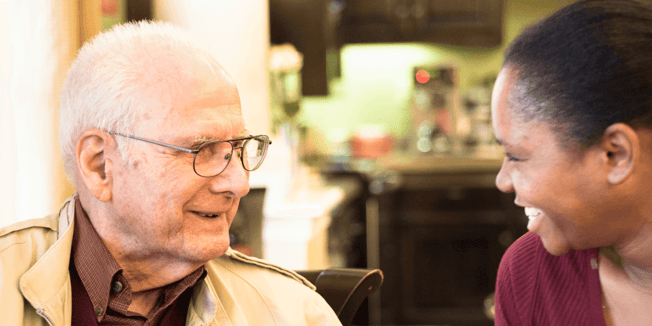Family FAQs About Alzheimer’s Care Services
Wiki Article
Discover Compassionate Memory Care: Enhancing Lifestyle for Loved Ones
The trip of taking care of an enjoyed one with cognitive problems offers one-of-a-kind obstacles that can greatly affect household characteristics and psychological health. Thoughtful memory care facilities use a structured, supportive setting designed to attend to these challenges while boosting the lifestyle for citizens. By concentrating on personalized care and purposeful interaction, these centers not only uplift those influenced by problems like Alzheimer's and dementia however also give tranquility of mind for households. As we explore the necessary elements of thoughtful memory care, it ends up being clear that understanding these alternatives can make a considerable difference in the lives of all involved.
Comprehending Memory Care
Recognizing memory care involves recognizing the specialized support and services made to aid people with cognitive problems, such as Alzheimer's disease and other forms of dementia. Memory care facilities concentrate on creating a secure and structured environment that promotes the well-being of homeowners while addressing their special cognitive challenges.Key elements of memory care consist of trained personnel who are experienced regarding the intricacies of mental deterioration and relevant problems. These experts utilize evidence-based methods to boost cognitive function and preserve self-respect via individualized care plans. The physical setting is additionally customized to minimize confusion and advertise experience, usually including safe areas to avoid wandering. Alzheimer’s Care Charlotte.Moreover, memory care stresses social interaction and purposeful tasks that boost cognitive capacities and foster connections among locals. This strategy identifies the importance of keeping social communications to fight seclusion typically experienced by people with memory loss.Families play an essential duty in memory care, as their involvement aids produce a supportive network that improves the lives of citizens. By understanding the customized nature of memory care, households can make informed choices to enhance the lifestyle for their liked ones facing cognitive disabilitiesKey Attributes of Compassionate Care
Caring care in memory care setups is identified by a holistic method that prioritizes the psychological and psychological well-being of homeowners. Key functions of this strategy include individualized care plans customized to each local's special demands, preferences, and life history. This personalization promotes a sense of identification and belonging, which is important for those experiencing cognitive decline.Another crucial attribute is the existence of skilled personnel who are not just experienced in dementia care but additionally compassionate and empathetic. These caregivers take part in significant communications, making use of strategies such as validation therapy to get in touch with locals and decrease sensations of disappointment or anxiety.Additionally, caring care atmospheres focus on sensory excitement and restorative activities that reverberate with locals' rate of interests. This may include art therapy, songs sessions, and reminiscence tasks, all made to improve cognitive feature and emotional connection.Furthermore, family members participation is urged, enabling liked ones to join care activities and support their relative's emotional needs. Inevitably, the vital attributes of thoughtful care develop a setting where citizens feel safe, valued, and understood, greatly enhancing their high quality of life.Benefits for Homeowners and Households

Activities That Foster Involvement
Significant tasks play a crucial function in fostering involvement among homeowners in memory care settings. These tasks not only boost cognitive function yet also advertise social interaction, psychological well-being, and a sense of function. Customized programs that take into consideration residents' interests and abilities are very important for maximizing participation and enjoyment.Creative searches, such as paint, crafting, or music treatment, urge self-expression and can evoke positive memories. Structured exercise sessions, including chair yoga exercise or walking groups, improve physical wellness while providing chances for socialization. Additionally, reminiscence treatment, which entails going over previous experiences and significant life events, can strengthen connections in between homeowners and caregivers.Incorporating interactive games, puzzles, and even horticulture can better stimulate cognitive engagement and foster team effort among citizens. Frequently set up team activities, such as film nights or themed celebrations, produce a sense of neighborhood, enabling locals to develop relationships and share experiences.Ultimately, the application of varied activities customized to private choices is crucial in memory care. By promoting interaction via purposeful shows, facilities can considerably improve the lifestyle for locals, ensuring they feel valued and connected within their community.Picking the Right Memory Care Center
Picking a memory care facility includes careful factor to consider of different aspects that affect the well-being of residents. Begin by evaluating the facility's overall environment, ensuring it is secure, inviting, and developed to decrease complication. Search for spaces that urge social communication while offering privacy for personal reflection.Next, assess the qualifications and training of the personnel. Taking care of people with memory problems requires specialized understanding. Verify that team member receive recurring training in dementia care and utilize caring communication techniques.Additionally, consider the variety of solutions used, such as individualized care strategies, restorative activities, and assistance for relative. A center that emphasizes holistic care can significantly enhance the lifestyle for residents.Visit potential facilities to observe interactions between team and homeowners, and ask regarding their strategy to engaging those with memory obstacles. Check testimonials and look for suggestions from medical care experts or neighborhood support groups.Lastly, take into consideration the facility's location and accessibility for household visits, as routine call can improve citizens' psychological well-being. By taking these aspects into account, you can make a well-informed decision that finest sustains your enjoyed one's demands.Regularly Asked Concerns
What Certifications Do Memory Care Team Typically Have?
Memory care staff typically hold qualifications that include specialized training in dementia and Alzheimer's care, as well as certifications in first help and CPR. Several have backgrounds in nursing or social work, supplying them with crucial abilities in individual assessment and emotional assistance. Alzheimer’s Care. In addition, continuous education in behavioral management techniques and communication techniques is typical, making sure personnel stay proficient at attending to the distinct requirements of people with cognitive impairments while fostering a supportive environmentJust How Can Households Take Part In Their Family member's Care?

What Is the Expense Array for Memory Care Providers?
The cost array for memory care services can vary significantly based on aspects such as area, center services, and level of care required. Generally, families might anticipate to pay between $4,000 and $8,000 each month. Additional solutions, specialized programs, and private holiday accommodations can further affect rates. Alzheimer’s Care. It is advisable for family members to completely research study and see facilities to recognize what is included in the fees and explore monetary aid alternatives readily availableExist Specific Dietary Options Available for Locals?
Yes, lots of memory care centers use tailored dietary options to fulfill the particular my response nutritional demands of citizens. These options generally consider different dietary limitations, such as diabetes, heart wellness, or allergic reactions. Facilities typically utilize licensed dietitians to develop dish plans that advertise general well-being while considering private preferences. Furthermore, relative are typically urged to get involved in discussions concerning nutritional options to guarantee that their liked ones' tastes and demands are respected.Just How Are Emergencies Handled in Memory Care Facilities?
Emergency situations in memory care facilities are taken care of through developed procedures made to ensure resident safety and quick response. Personnel are trained in emergency situation procedures, consisting of first aid and discharge strategies - Memory Care Charlotte. Facilities conduct routine drills to get ready for numerous scenarios, such as clinical emergencies, fires, or natural calamities. Furthermore, interaction systems remain in area to alert personnel and emergency situation services without delay, guaranteeing that homeowners receive instant focus and care during important situationsReport this wiki page